The question above, particularly relevant today on World Autism Awareness Day, was answered by a group of five lecturers during the first FIDE Introductory Seminar “Chess for children with an autism spectrum disorder. How chess can help children with autism” held on March 29.
130 representatives of chess federations and FIDE academies took part in the two-hour event, organized as part of the Autism Awareness Week. The audience included legendary figures like Judit Polgar, Artur Yusupov, and the former Women’s World Champion Antoaneta Stefanova.
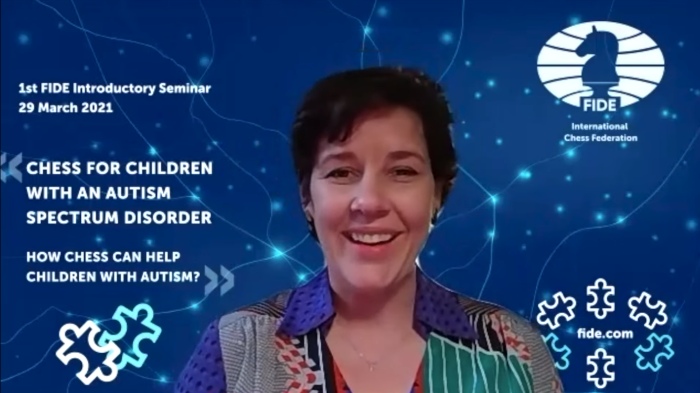
“You’d see a quote in one of today’s presentations which says ‘Autism is not a disability, it is a special ability’. But how to make use of it? And our answer today would be to think of chess as a discipline that might not only give enjoyment, satisfaction and pleasure to these special kids but also improve their physical and mental health,” said FIDE Managing Director Dana Reizniece-Ozola in her welcome speech.
Five speakers from different parts of the world shared their experiences in teaching chess to children with ASD: Ala Mishchanka, Special needs educational assistant from Canada with more than 15 years of experience, made an introduction to the concept of “Autism Spectrum Disorder”.
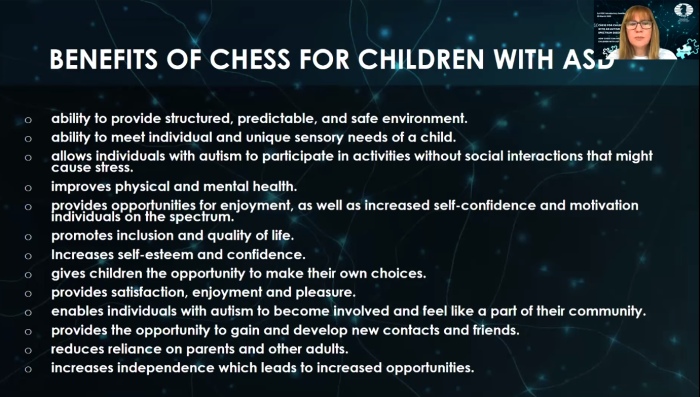
“Some sports can be challenging for kids with ASD; that’s why it is important to help children choose sports they are likely to enjoy and excel at”, says Ala Mishchanka. “But not every sport requires high-level communication and cooperation and could be a great match for children with autism. Chess is definitely one of them.”
The next lecturer was Dr Lilit Karapetyan, Senior researcher at the Chess Research Institute of the Abovyan Armenian State Pedagogical University (ASPU), and Lecturer at the Department of Special Pedagogy and Psychology. Lilit shared the Armenian experience in chess lessons with students with an autistic spectrum disorder. They used unique chess tasks and lessons to develop speech and other cognitive processes and regulate the behaviour of children with ASD.
“The study showed the effectiveness of special psychological-pedagogical methods. These methods are also very effective in the development of spatial orientation. Based on the work done during the chess lessons with children with ASD, we suggest the list of methods and exercises.” Lilit’s colleague Dr Anna Charchyan also a researcher in chess at ASPU, with a Ph.D. in Pedagogy, and Lecturer in Speech Therapy and Occupational Therapy at the Faculty of Special and Inclusive Education, provided practical advice and comments about each of them, which you can find in the seminar’s video recording.
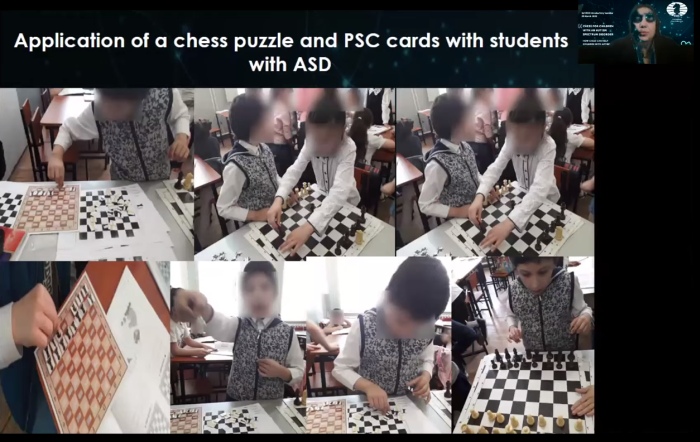
WIM Natalia Popova, Trainer at the FIDE Chess Academy in Belarus who has led a project in Minsk for the last two years, was the next one to share her experience. She stressed the positive impact that chess lessons had on the children, and how this progress was also acknowledged by the parents:
“If we speak about the personal development of a child with ASD, even I, not being a specialist in ASD children, witnessed the first signs of positive results within the first three or four months. Children pronounced the words more clearly, were able to formulate their thoughts. The children that are non-verbal and have problems with hearing demonstrated the ability to answer simple questions. Last year, many children worked only in the presence of their parents. This year, most children work without their parents; only one boy requires his mum’s presence. Last year, several children demonstrated significant aggression. This year they have become less aggressive and show at least some control of their aggressive behaviour. They became more persistent. So within a year, their behaviour and overall interaction have improved.”
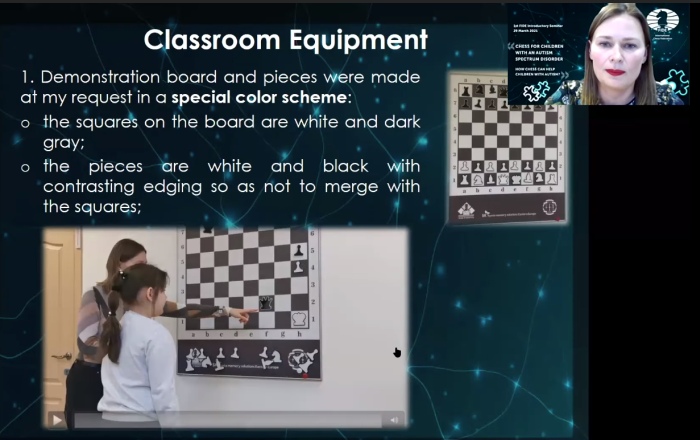
Dr Sandra Maria Guisso, Ph.D. in psychology and MSc in Biology and Education, is a very reputed authority who studies the game of chess in various situations of daily life and with people affected by Down syndrome, autism, and people deprived of freedom. In her dissertation “the game of chess and the autistic child” she presented a case study from Brazil.
“This study shows us that autistic kids are not abnormal, they are just different. We have abilities that we need to work on. In the same way, the autistic child has abilities that need to be worked on. We, researchers, always look for new tools to develop those abilities. Chess is one of the tools that we can use more,” stressed Dr Sandra Maria Guisso.
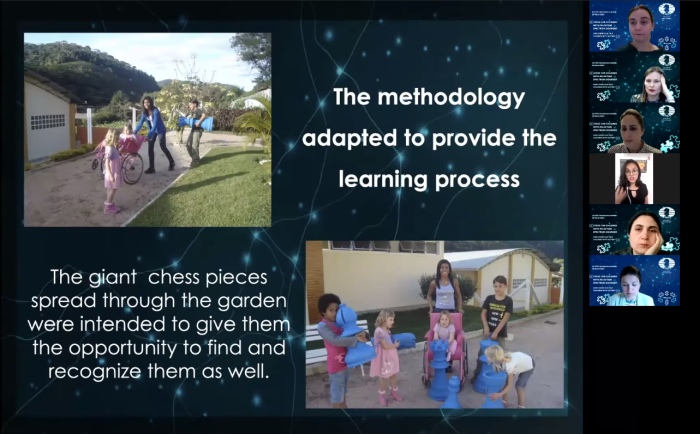
According to the latest data, 1 in 54 children has ASD in the USA, and the prevalence has increased 178% since 2000. FIDE believes that using chess as a development tool is an important priority, and will continue supporting educational efforts in this direction.
“From FIDE side, we are willing to have further follow-up activities, allowing us to use our royal game as an efficient tool for empowerment, social integration and psychosocial well-being of those members of society who need it the most, in this case, it’s the kids with autistic spectrum disorder, always unique, totally intelligent and sometimes mysterious,” said Dana Reizniece-Ozola in conclusion.
The first introductory seminar proved that there is a big interest in the topic from the federation representatives and chess trainers. We hope that the follow-up surveys will confirm the interest and we will have a basis to expand on the project, providing more seminars and training courses as soon as in summer.
You can watch the complete recording of the seminar on the FIDE YouTube channel.
All the presentations are also available for download:
Indroduction to Autism Spectrum Disorder (by Ala Mishchanka)
Chess lessons with students with autistic spectrum disorder: Armenian experience (by Lilit Karapetyan and Anna Charchyan)
Belarus project teaching chess to children with autistic spectrum disorder (by WIM Natalia Popova)
The game of chess and the autistic child: A study case (by Sandra Maria Guisso)
We would like to thank FIDE Vice President Anastasia Sorokina, and Nadezhda Kravchuk, a member of the FIDE Social Commission, for their initiative in organizing this successful event.

